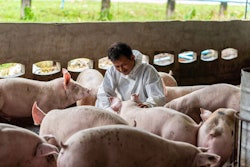
Officially registering new cases of African swine fever (ASF) in domestic pigs have been Bulgaria, Poland, Romania and Russia, and more wild boar have tested positive in 6 European states.
In Poland, the number of African swine fever (ASF) outbreaks so far this year has reached 119.
According to the country’s chief veterinary office, outbreaks have involved a total of 43,465 pigs in the country. These are the totals since the disease returned to Poland in mid-March after a five-month hiatus.
At the end of October, presence of the ASF virus was confirmed at two farms. One with 2,900 animals including 254 sows was in the northeastern province of Warmia-Masuria. Around 540 fattening pigs were involved in the second outbreak in the south of the country in Holy Cross province (Swietokrzyskie).
Fifth farm infected in Russia’s Belgorod region
Over the past two weeks, the World Organisation for Animal Health (OIE) has been informed about new cases of ASF in eight regions of Russia.
While most of these latest outbreaks have been in small pig herds, the Russian veterinary authority has confirmed the presence of the virus at a commercial farm in Belgorod. In the third week of October, one case was reported among the 17,888 pigs at this facility.
This outbreak brings the total outbreaks in Belgorod since September to five. With all the affected premises being substantial commercial farms, the number of pigs directly affected is approaching 70,000.
Around two weeks ago, one of Russia’s leading pork companies reported that the ASF virus had been detected at one of its pig breeding facilities in Belgorod. It is unclear whether this is the outbreak included in the latest OIE report.
Belgorod is situated in the Central federal district of Russia, where one further outbreak of ASF has been registered in each of two further regions.
First cases of ASF for three years have occurred in the region of Lipetsk. At the end of last month, 57 pigs died at a farm there with around 1,440 animals. Meanwhile in Kostroma, the number of outbreaks increased to six as a backyard herd tested positive for the virus at around the same time.
Also in the Central federal district are the regions of Bryansk, Vladimir and Yaroslavl, where additional cases of ASF and mortalities have been registered with the OIE. However, no new outbreaks are reported.
Located in the Volga federal district are Perm krai and Samara oblast. One more outbreak has been confirmed in a backyard herd in Perm, bringing total outbreaks there to four. Additional cases of the disease have been confirmed in three backyard or village herds in Samara.
2 farms hit by ASF in Romania
Two farms are among the 56 premises with domestic pigs with confirmed ASF cases in Romania.
Both of the affected farms were located in the south of the country, according to the latest OIE notifications. During the last week of October, presence of the virus was detected at a commercial premises with almost 13,000 pigs in the county of Arges, and in Calarasi in a herd of almost 8,400 pigs.
Other 54 latest outbreaks were among Romanian backyard herds.
Bulgaria reports return of ASF
At the start of November, a farm in the central province of Plovdiv was affected by ASF. One pig died out of the herd of 181 animals, reports the national animal health agency.
According to its official report to the OIE, this outbreak represented the recurrence of the disease since August.
The outbreak — in the village of Radinovo — is the country’s second this year on a commercial farm, reports the national food safety agency. Control zones have been set up in the area, and culling and disposal of the remaining East Balkan pigs on the farm are underway.
According to the agency, three of the previous outbreaks in Bulgaria occurred in August, starting with another commercial herd in the neighboring province of Pazardhik. This was followed by other cases in backyard herds — one in the same province, and two in neighboring Plovdiv. The most recent case in a single domestic pig was detected in September.
So far in 2021, around 200 cases of ASF have been reported in Bulgaria’s wild boar population, including four cases during October.
Ukraine, Russia each record ASF situation in 1 region ‘resolved’
At the start of this month, Ukraine’s veterinary authority declared to the OIE that the ASF situation has been “resolved” in Kharkiv.
In this eastern region of the country, there was just one outbreak. At the start of September, this affected a small group of domestic pigs in a natural park. No further cases have been recorded in the region since that time.
In the Central federal district, the Russian authorities report the ASF situation ended in the Oryol region. This came after two cases of the disease in wild boar, and one outbreak in a backyard pig herd between mid-July and the end of August.
Germany: Wild boar outbreak total passes 2,600
Last week, authorities in the state of Saxony were setting up new measures to the control the movement of wild boar, reported German pig farming website, Schweine. Under construction are new fences to surround the “core area” in the Meißen district. Also ongoing in this area are the search for dead wild boar, and an order preventing the disturbance of the wild animals.
In mid-October, it was announced that the first cases of ASF in wild boar had been detected in the state’s district of Meißen. All previous cases in this state had been in Görlitz.
Part of the Saxony forest was used for military training, but this stopped with the discovery of ASF.
Last week, Parliamentary State Secretary to the Federal Minister for Food and Agriculture visited the area. Secretary Uwe Feiler said the army can now access the area again. This came after close cooperation on rapid fence construction, consistent hunting pressure and close monitoring of the wild population.
Across Germany, the number of wild boar that have tested positive for the ASF virus has risen to 2,601 (as of November 4). This total comprises 1,993 cases in the eastern states of Brandenburg, and 608 in Saxony. Virus-positive wild animals have been found in seven districts in Brandenburg, and two in Saxony.
ASF situation in wild boar elsewhere in Europe
In addition to Germany, five other European states have reported new cases of ASF among their respective wild boar populations over the past week.
According to the nation’s chief veterinary office, a further 66 animals have been involved in 60 outbreaks in Poland over this period.
Meanwhile, reporting new cases to the OIE have been Romania (29), Latvia (22), Hungary (8) and Russia (1).
View our continuing coverage of the global African swine fever situation.

















